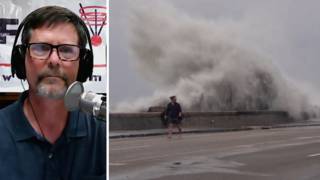
Guests
- Luis GutiérrezDemocrat of Illinois and co-chair of the Immigration Task Force of the Congressional Hispanic Caucus.
In the Caribbean, Hurricane Maria strengthened rapidly Monday over the warm waters of the Atlantic, growing from a Category 1 to a Category 5 storm in a single day and threatening Puerto Rico and other islands already suffering from Hurricane Irma’s landfall earlier this month. On Monday evening, the storm’s eye passed directly over Dominica, where Prime Minister Roosevelt Skerrit wrote online, “My roof is gone. I am at the complete mercy of the hurricane. House is flooding.” He later said he had been rescued, but that the island had been devastated. The storm also brought high winds and flooding to Guadeloupe, the staging ground for relief efforts for islands ravaged by Hurricane Irma. Maria now threatens the capital of Puerto Rico, San Juan, with a possible direct hit as a major hurricane. For more, we speak with Democratic Congressmember Luis Gutiérrez.
Transcript
JUAN GONZÁLEZ: And now the new Hurricane Maria that is barreling, a Category 5 hurricane, straight for Puerto Rico, an island that’s already reeling from—
REP. LUIS GUTIÉRREZ: Yes.
JUAN GONZÁLEZ: —the previous hurricane, as well as its financial crisis. Your sense of what’s going on right now? It’s expected to hit landfall as early as tonight.
REP. LUIS GUTIÉRREZ: God, hasn’t happened in 80 years. That is a direct hit. But, you know, Juan, to me, it’s not an accident, as there have been four hurricanes, and that this might become the new normal in terms of how it is we deal, given climate change. And so, that’s from a general point of view.
From a more personal, I know for you, for me, Juan, for our family members, that’s a place that we love. It’s our home. You know, it might be our ancestral home, because we’re in Chicago or in New York, but it’s our home and our house. And I ask Americans to be generous, because I have a really sad feeling that it’s going to be quite devastating, this hurricane. Now, let’s hope you guys can run the tape and say, “Oh, Luis was wrong.” But, you know, we barely got past Irma.
And our infrastructure is so weak in Puerto Rico. And Juan and I were talking—it was like six hours before Irma even touched Puerto Rico, the lights were out. And now we have a control board whose primary mission is what? Pay the bondholders, not fix the infrastructure.
JUAN GONZÁLEZ: Well, interestingly—interestingly, Luis, the union of electrical workers in Puerto Rico has now been claiming that during Irma, that the electric company deliberately did not send out crews to repair the electrical lines, because the new privately controlled electric company was looking to build up popular support for complete privatization of the electric system.
REP. LUIS GUTIÉRREZ: I would not be surprised. Remember, for your audience, the public utility is a public—in other words, owned by the people. And there was nothing better than corporate greed to go out there and take it over and now control the energy grid of the people of Puerto Rico. And look, the control board, they’re going to pay the bonds. They’re not going to invest in that grid system and water grid. And the thing is, water goes out. A tropical island without water—I mean, how could that be? Because we make absolutely no plans to set up reserves, and we build homes everywhere. And the mountainsides—the Mother Earth is saying, “You’re not giving us anything to retain the water, so when you need it, I can give it to you.” That’s what the earth in Puerto Rico is saying. So we need better planning. And we need, unfortunately, and I don’t see it in the near future—that’s why, you know, when PROMESA came up, I said no. I cannot transfer a terrible colonial system and then have seven unappointed, unaccountable—
AMY GOODMAN: Explain PROMESA.
REP. LUIS GUTIÉRREZ: PROMESA is a—so, Puerto Rico is $72 billion in debt. The federal government says, “Oh, we’re going to help you. Here’s the help.” And remember, what did the congressman say time and time again? “Vote for this, because it isn’t going to cost us a penny.” Three-and-a-half million people in need, and the Congress says, “We’re going to do something, as long as it doesn’t cost us a penny.”
So they set up a control board made up of seven individuals, four of them Republican, three Democrats. The majority come from the financial service sector, the very sector that was involved in the selling of these bad bonds to the people of Puerto Rico and to the government and setting up. And they’re there. Now they make all the decisions. The governor doesn’t run Puerto Rico. The Legislature doesn’t run Puerto Rico. No, they have to run everything through, and there is a veto power of this control board of seven—of six men and one woman. Sad.













Media Options